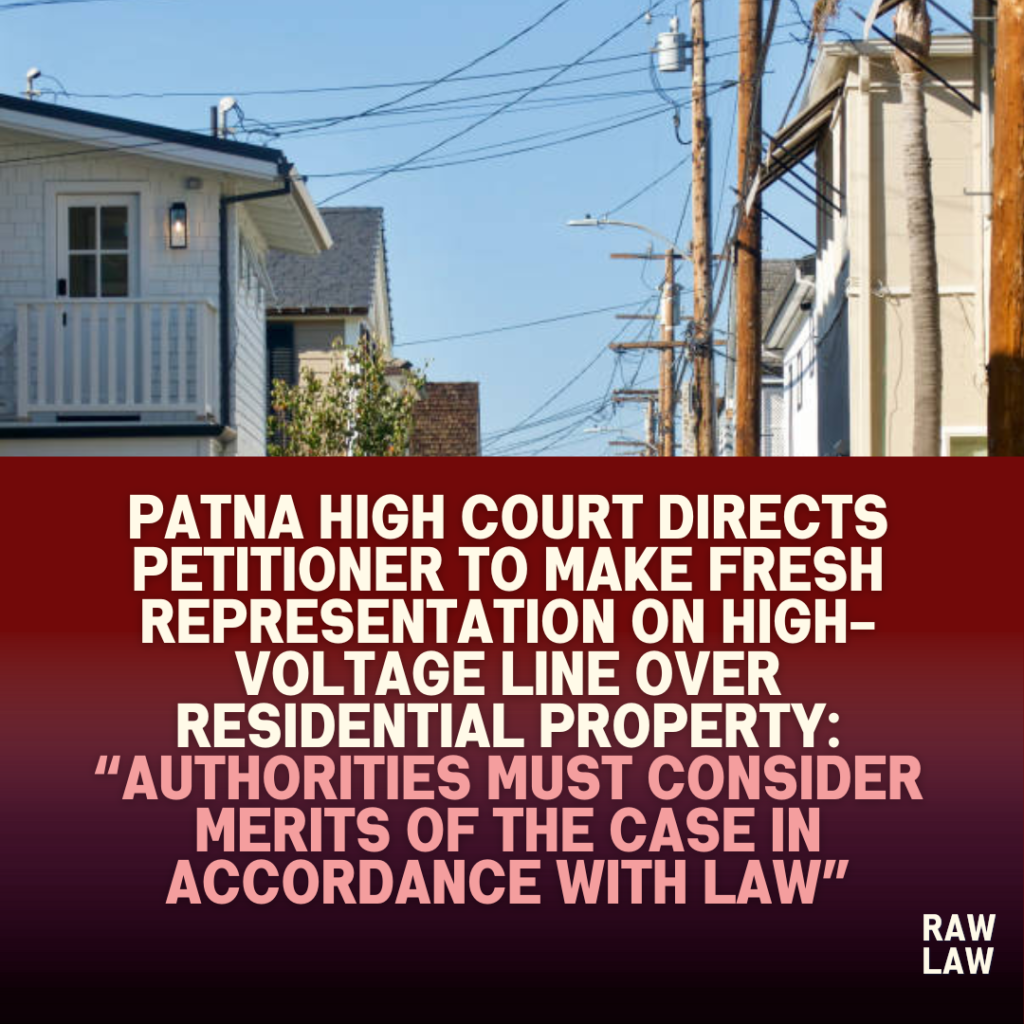Judgment Name: Urmila Devi v. State of Bihar & Ors.
Date of Judgment: 19 June 2025
Coram: Hon’ble Justice G. Anupama Chakravarthy
Court’s Decision:
The Patna High Court disposed of a writ petition seeking the removal of a 33,000 KV electric overhead line passing over the petitioner’s residential premises. The Court directed the petitioner to make a fresh representation before Respondent No. 5 (Executive Engineer, Electricity Transmission Division, Muzaffarpur) within one month. The respondent was directed to “pass an appropriate order in accordance with law, considering the merits of the case.”
Facts:
The petitioner, a resident of Muzaffarpur, sought the Court’s intervention to remove an overhead electric line of 33,000 KV that ran directly over her residential property, located at Khata No. 466, Khesra No. 464, Village Brahampura, Sadar Muzaffarpur. She claimed that the presence of such a high-voltage line endangered the safety and life of her family.
The petitioner submitted that despite raising representations before the authorities, no action was taken. The petition was filed invoking Section 67(2)(c) and Section 68 of the Electricity Act, 2003, which deal with the procedure and authorisation for laying overhead electric supply lines and related public safety considerations.
Issues:
- Whether the installation of the 33,000 KV electric overhead line directly above a residential house violates safety norms?
- Whether the respondents failed to act on the petitioner’s representation as per the Electricity Act, 2003?
Petitioner’s Arguments:
The petitioner argued that the 33,000 KV overhead line endangered her life and that of her family members. Despite submitting a representation to the concerned electricity distribution company, no action had been taken. The counsel relied on Sections 67(2)(c) and 68 of the Electricity Act, 2003, to contend that the authorities were required to consider public safety and take corrective steps.
Respondent’s Arguments:
The State and electricity authorities contended that the representation was addressed to Muzaffarpur Vidyut Vitaran Limited, which was not made a party to the writ petition. Hence, the respondent counsel stated they had no instructions regarding the petitioner’s application or its disposal.
Analysis of the Law:
Sections 67(2)(c) and 68 of the Electricity Act, 2003 require that electric lines, especially of high voltage, be laid in a manner that does not compromise public safety. The laying of overhead lines without due process or authorisation may expose the executing agency to liability, particularly when it endangers human life or residential habitation.
The Court did not enter into a detailed adjudication of the matter but upheld the principle that administrative authorities must consider genuine representations in accordance with statutory provisions.
Precedent Analysis:
No specific prior judgments were cited or relied upon by the Court. However, the approach aligns with the broader judicial principle of audi alteram partem (right to be heard) and procedural fairness under administrative law.
Court’s Reasoning:
The Court took a pragmatic approach, noting that since the entity to which the representation had been submitted was not made a party, no instructions could be obtained by the counsel. Rather than deciding the matter on merits or technicalities, the Court allowed the petitioner the liberty to file a fresh representation with the correct respondent authority.
Conclusion:
The writ petition was disposed of with liberty to the petitioner to file a fresh representation within one month before the Executive Engineer, who was directed to dispose it of by passing an appropriate order in accordance with law.
Implications:
The ruling reinforces the procedural right of citizens to be heard by appropriate authorities in matters affecting public safety. It reiterates the duty of State utilities to consider complaints under the Electricity Act and respond appropriately.
